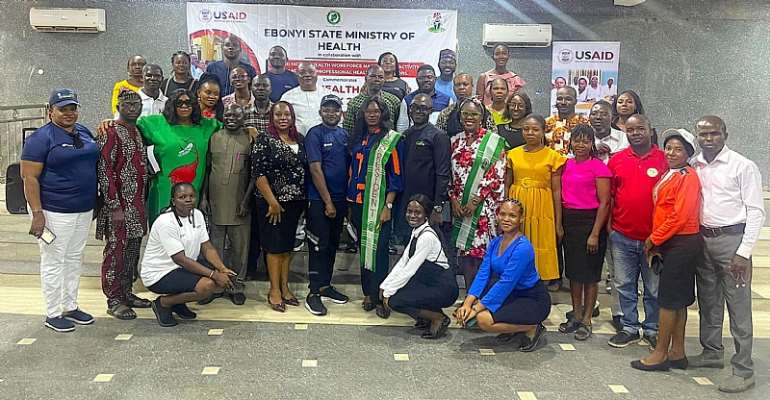HWW: Adequate Health Training Budget, Panacea To Lingering Shortage Of Health Workers In Nigeria - Stakeholders.

Ebonyi health stakeholders have identified proper investment in pre-service and in-service training as a panacea to the shortage of quality healthcare personnel in Nigeria.
The position was part of outcome a multi sectorial dialogue held Wednesday in Abakaliki, Ebonyi State capital.
The Dialogue was organised by the USAID- funded Health Workforce Management Activity in partnership with the State Ministry of Health.
It was part of events to commemorate the 2024 Health Workers week in Ebonyi State.
Discussants observed that the environment in which health workers receive pre-service training determine their eventual output in service, stressing that in-service training was necessary to keep the worker updated of recent developments in health service delivery.
They further lamented the big disparity between the number of students graduating from health training institutions and the number eventually absorbed into the system, and called on government to work towards closing the gap to guarantee Sustainability and succession in the sector.
Summarizing the position of the discussants, the State President, Medical Women Association of Nigeria, Ebonyi State chapter, Dr. Lilian Nwobashi and recommended deliberate policies aimed at making the health sector more lucrative and attractive to encourage retention of health professionals while discouraging the brain drain syndrome threatening the sector.
Nwankwo said: "Government is supposed to provide enabling environment and adequate budgetary provision for in-service training of health workers to make them better able to provide adequate services to clients.
"Healthcare workers on their part should employ the right sense and be just in recommending deserving personnel for in-service trainings rather than based on selfish considerations.
Speaking to Newsmen, another discussant, Chibuike Eluwa, noted that health training institutions mandatorily required certain levels of operational standards to meet some statutory requirements.
These requirements, according to him, demand certain level of financial stability to attain.
Eluwa explained: "Concerning the pre-service environment, we identified some gaps in terms of the production not matching the translation of those students into Healthcare workers providing services in Ebonyi State.
Some of those itemized challenges include the absorption rate from the training institutions into the mainstream health sector to provide services, provision of scholarships to students and generally the management of institutions, and retention of these students within the system after their graduation.
"The large part of it is investment in the health sector, and primarily in the pre-service training institutions because these institutions function with a certain level of quality.
"For instance they need to undergo accreditation from time to time, and they need to pay for quality lecturers and educators and all these are largely dependent on the amount of funding.
"There is also the need to make the health sector more lucrative to make the graduates coming out of that system to want to be a part of the health sector, and also want to provide health services."
Speaking on the objectives of the meeting, the State Program Coordinator, USAID Health Workforce Management Activity, Dr.Ibiam Azu Agwu, said it was to spotlight Frontline Human Resources for Health challenges and discuss effective implementation of immediate interventions; solicit inputs, solutions and innovative ideas for HRH priority area development as well as create awareness to the travails of frontline health workforce and resolve on innovative strategies to better support the heath system, among others.
Speaking on the theme for this year's celebration: "Safe and supported: invest in health workers", Agwu stressed that the safety and wellbeing of health workers should be among top priorities of both government and all well meaning groups and citizens.
"Every year in April, we celebrate our health workers.
"We take out time to appreciate them for all their sacrifices.
"Health workers risk their lives and many have died while trying to save other people's lives.
For this year, we decided to celebrate them with a theme "Safe and supported: invest in health workers
"We have to be sure that they are safe and that they are supported.
"Everyone, government, private organisations, individuals, we are all to invest in our Health workers.
"Today we have gathered experts from various sectors for a multi-sectorial dialogue on how to improve our health training institutions such that we can guarantee the quality of healthcare professionals that we are producing in one hand, and on the other hand, what we can do as a country to reduce the Japa syndrome whereby health care workers flee the country in search of better conditions abroad."
Agwu, who Commended Governor Nwifuru for the improvements he has brought into the health sector in the state, solicited for more attention to the primary healthcare subsector as the foundation of healthcare services in the state.
On the foul attitude of some medical workers against patients, Agwu said his Organization for the past one year have been training health tutors through its Health Connect Initiative, on how to inculcate in their trainees the right behaviour and attitude towards patients knowing that there is a psychological aspect to healing.
"How the medical worker relates to the patient is a major determinant of the recovery process" he emphasized.
The USAID funded Health Workforce Management Activity is active in five states in Nigeria: Ebonyi, Bauchi, Sokoto, Kebbi and the FCT.
The meeting was preceded by sensitization road walk and outreach to some rural communities in the State.
